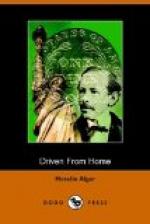“You have one staunch friend at home,” said Gilbert.
“You don’t allude to Peter?”
“So far as I can judge, he hates you like poison. I mean Jane.”
“Yes, Jane is a real friend. She has been in the family for ten years. She was a favorite with my own mother, and feels an interest in me.”
“By the way, your stepmother’s charge that you took a wallet containing money from her drawer has been disproved by Jane. She saw Peter abstracting the money, and so informed Mrs. Crawford.”
“I am not at all surprised. Peter is mean enough to steal or do anything else. What did my stepmother say?”
“She was very angry, and threatened to discharge Jane; but, as no one would be left to attend to the dinner, I presume she is likely to stay.”
“I ought to be forming some plan,” said Carl, thoughtfully.
“Wait till you hear from home. Julia will see that your time is well filled up till then. Dismiss all care, and enjoy yourself while you may.”
This seemed to be sensible advice, and Carl followed it. In the evening some young people were invited in, and there was a round of amusements that made Carl forget that he was an exile from home, with very dubious prospects.
“You are all spoiling me,” he said, as Gilbert and he went upstairs to bed. “I am beginning to understand the charms of home. To go out into the world from here will be like taking a cold shower bath.”
“Never forget, Carl, that you will be welcome back, whenever you feel like coming,” said Gilbert, laying his band affectionately on Carl’s shoulder. “We all like you here.”
“Thank you, old fellow! I appreciate the kindness I have received here; but I must strike out for myself.”
“How do you feel about it, Carl?”
“I hope for the best. I am young, strong and willing to work. There must be an opening for me somewhere.”
The next morning, just after breakfast, a letter arrived for Carl, mailed at Edgewood Center.
“Is it from your father?” asked Gilbert.
“No; it is in the handwriting of my stepmother. I can guess from that that it contains no good news.”
He opened the letter, and as he read it his face expressed disgust and annoyance.
“Read it, Gilbert,” he said, handing him the open sheet.
This was the missive:
“Carl Crawford:—As your father has a nervous attack, brought on by your misconduct, he has authorized me to write to you. As you are but sixteen, he could send for you and have you forcibly brought back, but deems it better for you to follow your own course and suffer the punishment of your obstinate and perverse conduct. The boy whom you sent here proved a fitting messenger. He seems, if possible, to be even worse than yourself. He was very impertinent to me, and made a brutal and unprovoked attack on my poor boy, Peter, whose devotion to your father and myself forms an agreeable contrast to your studied disregard of our wishes.




